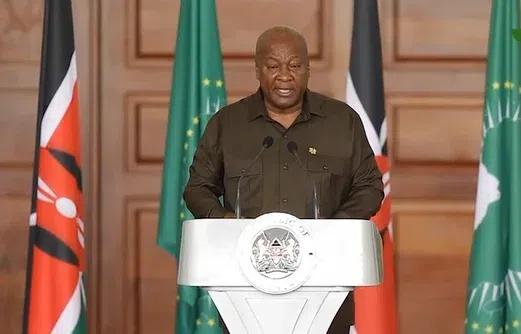
Beyond personal and commercial disputes, Ghana faces an urgent national imperative to deliver swift justice in cases of corruption and looting, a private legal practitioner Professor Stephen Kwaku Asare has said.
Prof Asare states that there is a widespread belief that the nation’s resources have been plundered, and this perception undermines faith in democracy and governance.
To that end, he says, accountability demands that those who have looted public funds face justice, yet the current system, bogged down by endless adjournments and frivolous interlocutory appeals, is often weaponized to frustrate prosecutions.
“A judicial system that enables such delays is not merely inefficient; it actively erodes public trust and emboldens impunity,” he said.
“The transition to a fast justice system is not just about efficiency; it is about restoring faith in the rule of law, reinforcing democratic stability, and ensuring that accountability is not lost in procedural gymnastics,” he wrote on Facebook while making a case for speedy trials in Ghana’s courts.
He argued that slow justice is a silent killer, suffocates accountability, erodes justice, and weakens democracy.
It is time to transition to a fast justice system, he said.
While some Ghanaians may characterize this as a radical call, he indicated that his call is nothing new. Referring to what former President John Agyekum Kufuor did when in office, Prof Asare stated that when Mr Kufuor introduced the Fast Track Court, it was welcomed as a step toward timely justice delivery.
Yet today, he said, advocating for system-wide fast justice meets unwarranted resistance.
“What is their fear? The truth is, justice delayed is justice denied, and a slow judicial system is a silent accomplice to injustice. This is not to suggest that haste should override fairness; rather, we seek a justice system that moves swiftly yet deliberately, ensuring fairness while preventing unnecessary delays.”
Below is his full post…
Repeats Call for a Fast Justice System
Slow justice is a silent killer. It suffocates accountability, erodes justice, and weakens democracy. It is time to transition to a fast justice system.
While [some Ghanaians] may characterize this as a radical call, it is nothing new. When J.A. Kufuor introduced the Fast Track Court, it was welcomed as a step toward timely justice delivery.
Yet today, advocating for system-wide fast justice meets unwarranted resistance. What is their fear?
The truth is, justice delayed is justice denied, and a slow judicial system is a silent accomplice to injustice. This is not to suggest that haste should override fairness; rather, we seek a justice system that moves swiftly yet deliberately, ensuring fairness while preventing unnecessary delays.
Beyond personal and commercial disputes, Ghana faces an urgent national imperative to deliver swift justice in cases of corruption and looting. There is a widespread belief that the nation’s resources have been plundered, and this perception undermines faith in democracy and governance.
Accountability demands that those who have looted public funds face justice, yet the current system, bogged down by endless adjournments and frivolous interlocutory appeals, is often weaponized to frustrate prosecutions.
A judicial system that enables such delays is not merely inefficient; it actively erodes public trust and emboldens impunity.
The transition to a fast justice system is not just about efficiency; it is about restoring faith in the rule of law, reinforcing democratic stability, and ensuring that accountability is not lost in procedural gymnastics.
Time Standards: The Engine of Fast Justice
At the heart of this reform is the introduction of Time Standards for Trial and Appellate Courts. Think of it as a structured framework that sets clear expectations for case resolution. These standards aim to eradicate case backlogs, reduce inefficiencies, and restore judicial credibility.
Before critics dismiss time standards as impossible, let us remind them that such standards exist in many jurisdictions. Even here at home, we enforce strict timelines for presidential election petitions (PEP)—a recognition that some cases are too important to be left to indefinite delays. The same logic that justifies PEP timelines applies to this broader reform.
A system that moves swiftly and predictably benefits not just individual litigants but the entire fabric of governance, ensuring that justice is neither a privilege nor a mirage, but a guaranteed right for all.
Proposed Time Standards for Case Resolution
Trial Courts
- Criminal Cases
- Misdemeanor cases: 6 months from arraignment
- Felony cases: 12 months from arraignment
- Capital offenses: 24 months from arraignment
- Civil Cases
- Simple claims (e.g., debt recovery, landlord-tenant disputes): 6 months
- General civil cases (e.g., contract disputes, torts): 12 months
- Complex civil litigation (e.g., class actions, corporate disputes): 24 months
- Family Law Cases
- Uncontested divorce and maintenance: 6 months
- Contested divorce and child custody: 12 months
- Adoption cases: 9 months
- Probate and Estate Matters
- Uncontested probate: 9 months
- Contested probate: 18 months
- Land Cases
- Simple land disputes (e.g., boundary disputes, trespass): 6 months
- Complex land litigation (e.g., adverse possession, title disputes): 12 months
- Election Petitions
- Presidential election petitions: 21 days
- Parliamentary election petitions: 60 days
Appellate Courts
- Appeals from Trial Court Decisions
- Civil and criminal appeals: 6 months from filing the record
- Fast-tracked appeals (e.g., election disputes): 1 month
- Supreme Court Cases
- Original jurisdiction (constitutional matters): 12 months
- Appeals to the Supreme Court: 9 months
- Review of Supreme Court decisions: 90 days
- Interlocutory Appeals During Trials
- Restricted to fundamental jurisdictional or natural justice breaches
- Determined within 30 days to avoid unnecessary delays
- No automatic stay during appeals.
Ensuring Accountability: The OMAMPAM System
A key concern with fast justice is whether it will compromise due process. This reform preserves fairness by introducing OMAMPAM, an automated judicial tracking system that:
- Allows citizens to monitor case progress, ensuring delays do not become systemic.
- Requires judges to provide justifications for case delays, enhancing judicial accountability.
- Restricts interlocutory appeals that serve as delay tactics.
- Mandates automatic scheduling of overdue cases for expedited hearings.
The case backlog remains a major challenge in Ghana’s judiciary. Under this reform:
- Court vacations will be cancelled, though judges will still be entitled to their usual leave.
- A system-wide court shutdown will be a thing of the past, ensuring continuous case movement.
For these reforms to succeed, judges and litigants must be held accountable. The reform introduces:
- Sanctions for unjustified delays, including disciplinary measures.
- Costs and penalties for frivolous appeals, deterring the misuse of legal processes.
- Periodic reviews of time standards, ensuring they evolve with judicial realities.
Technology and Infrastructure: The Backbone of Reform
To meet these time standards, we must invest in:
- Case management technology to automate scheduling and track case progress.
- Judicial training and specialization, ensuring judges efficiently handle cases within designated timeframes.
- Alternative Dispute Resolution (ADR) mechanisms, reducing the burden on trial courts.
A fast justice system is only as strong as its infrastructure. Without these investments, enforcement of time limits could create bottlenecks rather than resolve them.
Conclusion:
The proposed Time Standards for Trial and Appellate Courts are a bold and necessary step toward reforming the justice system. While implementation challenges exist, including judicial capacity and infrastructural limitations, the benefits of efficiency far outweigh the costs.
For this transition to succeed, we need:
- Strong leadership from the judiciary. Put people of courage & bold ideas on the Rules of Court Committee.
- Effective monitoring mechanisms.
- A commitment to procedural fairness.
Swift and fair justice are not mutually exclusive. Slow justice is not just a delay—it is a denial. It melts justice into just ice—cold, lifeless, and stripped of meaning. It’s time to turn up the heat with a fast justice system.
The post Endless adjournments and frivolous interlocutory appeals are frustrating prosecutions – Prof Asare first appeared on 3News.
Read Full Story









![[Video] Heartbroken husband of nurse who burnt to death inconsolable at funeral](https://sportal365images.com/process/smp-images-production/pulse.com.gh/16022025/16d8d3d4-b4c7-49b0-8b05-9608091145c1.jpg)








Facebook
Twitter
Pinterest
Instagram
Google+
YouTube
LinkedIn
RSS